The design of your workspace is an essential aspect of creating a positive impression on your ideal clients and fostering a strong connection with them. A thoughtfully designed space can boost productivity and creativity while also contributing to overall client satisfaction. An intentionally designed workspace shows your company’s commitment to delivering the highest standards to your clients and employees. Moreover, this demonstrates the value you put into understanding your client’s needs and preferences.
To create a workspace that attracts and retains the right clients, it’s essential to take a holistic approach that encompasses several key factors. Help your business secure a satisfactory and lasting partnership as we delve into the key factors of designing a workspace that resonates with your ideal clients.

Defining your brand identity is the cornerstone of attracting the right clients who align with your values, vision, and mission. Begin by introspectively examining your company’s mission, core principles, and the unique impact you aim to make in your industry. Identify the pain points you wish to address and the solutions you provide to your target audience.
By creating a well-defined brand identity that clearly communicates your company’s purpose, values, and the problems you aim to solve, you can effectively attract clients who resonate with your brand and are more likely to become loyal advocates for your business. This process will not only help you stand out in the market but also create a strong foundation for lasting and meaningful client relationships.
Prioritizing comfort and functionality is paramount when designing a workspace that appeals to clients and boosts productivity. To achieve this, invest in ergonomic furniture that promotes proper posture and comfort for both clients and employees. This reduces the risk of strain and fatigue. By thoughtfully arranging your workspace to maximize space utilization, you facilitate smooth client interactions and promote a more efficient work environment. By focusing on these elements, you can design a workspace that not only caters to the needs of your clients but also promotes the well-being and efficiency of your team.

Creating an inviting atmosphere is essential for making clients feel welcome and valued, ultimately leaving a lasting impression. Add personal touches to your workspace, such as artwork or decorative items that reflect your brand’s personality and values. Thoughtful lighting and comfortable seating can also contribute to a warm and inviting atmosphere. By carefully curating your workspace, you can create an environment that not only resonates with clients but also encourages positive associations with your brand.
Showcasing your expertise and success is essential in building trust and credibility with your clients. Displaying awards, certifications, and testimonials not only highlights your achievements but also instills confidence in your abilities. Featuring a portfolio of your work or case studies allows clients to see tangible examples of your success, and further solidifies your reputation.
Additionally, creating a designated space for client consultations or meetings demonstrates your commitment to privacy and professionalism, fostering an environment where clients can feel comfortable discussing their needs and concerns.

Maintaining a clean and organized workspace is essential for conveying professionalism and creating a positive impression on your clients. A clutter-free environment not only enhances productivity but also has a beneficial psychological impact on clients, as it demonstrates your attention to detail and commitment to maintaining a high standard of order. Implement effective storage solutions to keep your workspace neat and tidy, making sure that everything has a designated space.
Establish regular cleaning routines to ensure a consistently clean and inviting atmosphere. By prioritizing organization and cleanliness, you communicate to your clients that you value professionalism and are dedicated to providing a comfortable and orderly space for conducting business.
Embracing technology and integrating it seamlessly into your workspace is essential for staying competitive and showcasing your commitment to innovation. By incorporating the latest tech tools relevant to your industry, you can optimize your business processes and enhance your client’s overall experience. Ensure that technology is accessible and user-friendly, providing clear instructions or assistance when necessary, as this demonstrates your dedication to client satisfaction. A tech-savvy workspace not only leaves a lasting impression on clients but also positions your brand as a forward-thinking and adaptive leader in your field.

Designing collaborative spaces that encourage brainstorming, idea generation, and open communication is essential for generating creative solutions. A collaborative environment encourages nuanced interactions with clients and employees which can result in a productive exchange of ideas and approach to problems. By prioritizing collaboration, you create a positive work environment that reflects your brand values and demonstrates your commitment to excellence.
Incorporating sustainable materials and energy-efficient solutions into your workspace design showcases your commitment to the environment, appealing to eco-conscious clients. Being mindful of your environmental impact can enhance your brand image and demonstrate your dedication to sustainability.
A green workspace not only benefits the environment but also boosts your business’s reputation as a responsible and forward-thinking company. By prioritizing sustainability in your workspace design, you create a positive impact on the planet while resonating with clients who share your values.
Designing a workspace that appeals to and resonates with your ideal clients is crucial for building strong and lasting relationships. By prioritizing elements such as comfort, functionality, brand consistency, and technology, you create a space that fosters a positive client experience and reinforces your brand’s values. However, designing an effective workspace is an ongoing process that requires continuous evaluation and improvement. By regularly reassessing and updating your workspace to meet the changing needs and expectations of your clients, you can maintain an environment that remains relevant, appealing, and aligned with your brand values, ensuring long-term success and client satisfaction. A well-designed workspace is not only a reflection of your brand but also a powerful tool for attracting and retaining ideal clients.
In today’s rapidly evolving business environment, organizations are continuously seeking innovative ways to gain a competitive edge and enhance their operational efficiency. Outsourcing has emerged as a strategic solution for businesses to access specialized expertise, reduce costs, and focus on core competencies. However, the one-size-fits-all approach to outsourcing is becoming increasingly inadequate, given the diverse and ever-changing needs of modern businesses. This is where the value of customizing outsourcing services shines through.
Customizing outsourcing services to cater to the unique needs and expectations of businesses not only elevates the client experience but also fosters stronger, long-lasting relationships between service providers and their clients. By tailoring services, outsourcing companies can deliver targeted solutions that address specific pain points, ultimately leading to improved client satisfaction, loyalty, and retention.

Assessing a client’s business goals and objectives is vital for outsourcing companies to deliver tailored services that drive both immediate and long-term success. To achieve this, it is essential for outsourcing companies to understand and assess each client’s unique business goals and objectives. By aligning outsourcing services with the client’s priorities, it allows for tailored solutions that foster a collaborative and successful partnership.
First, begin by conducting in-depth consultations with the client to gain insights into their industry, market positioning, and specific challenges they are facing. This will help you understand their expectations and uncover underlying objectives they wish to achieve through outsourcing.
Second, conduct thorough research and analysis of the client’s industry, competitors, and target audience. This information will help you identify trends, opportunities, and potential threats that may impact the client’s business and guide your service offerings accordingly.
Lastly, work closely with your client to establish measurable criteria for your outsourcing services. These metrics should be aligned with the client’s business objectives and provide a clear benchmark to evaluate the effectiveness of your customized solutions.
Once you have a clear understanding of your client’s needs and expectations, customizing your offerings becomes a natural next step in providing exceptional service. Here are the following customized services you can offer to your clients:

Offer flexible pricing options catering to your clients’ budgets and requirements. By presenting a variety of pricing structures, including fixed, hourly, or performance-based options, you showcase your dedication to accommodating clients’ distinct financial needs. This adaptability fosters stronger partnerships and reinforces a reputation for being a client-centric and dependable outsourcing company.
Seat leasing can help in customizing outsourcing services by providing a flexible and scalable infrastructure that can be tailored to the client’s specific needs. Outsourcing companies can provide seats for their client’s remote staff and customize their facilities and resources, such as workstations, equipment, and amenities. Additionally, seat leasing offers employee oversight, which can result in improved service quality and faster turnaround times.
Offering specialized service packages enables a targeted approach that caters to the specific needs, industries, or project types of your clients. By gaining insights into the intricacies of various industries and tackling their unique challenges, you can develop service packages that showcase your expertise and dedication to resolving the clients’ particular pain points. This tailored approach sets your outsourcing company apart and builds lasting relationships with satisfied clients.

Develop and adapt bespoke software and tools to meet your client’s unique needs. This highlights your company’s innovative capabilities and commitment to staying ahead of the curve. Custom software solutions provide numerous benefits, including improved efficiency and productivity, while also tackling specific client challenges that may not be addressed by generic tools. By offering tailored technology solutions, your outsourcing company can better cater to client requirements and stand out in a competitive market.
Seamless integration with clients’ existing systems is vital for a smooth and hassle-free outsourcing experience. To achieve this, it is essential to understand the client’s software and system, with an outsourced remote staff ready to collaborate with the client’s IT team. This collaboration is good for developing customized integration solutions and conducting thorough testing and validation. By providing ongoing support and maintenance, outsourcing companies demonstrate their commitment to long-term client success and reinforce their reputation as dependable partners. Ultimately creating lasting relationships and fostering client satisfaction.

Dedicated account management is a crucial component of exceptional outsourcing services, as it ensures personalized service and streamlined communication. By assigning a dedicated account manager to each client, outsourcing companies create a single point of contact responsible for understanding the client’s unique needs, addressing concerns, and facilitating collaboration. This tailored approach not only enhances the client experience but can also foster trust and long-lasting relationships, ultimately contributing to client satisfaction and loyalty.
Adaptable communication channels are essential in fostering easy and efficient collaboration between outsourcing companies and their clients. By identifying and using the client’s preferred communication platforms such as Gmail, Slack, Microsoft Teams, Zoom, and Google Meet. Using these can help in providing seamless communication with your client. You may also use project management tools such as Monday.com, ClickUp, HubSpot, and Notion, to keep track of your team’s progress. Establishing clear communication and project tracking preferences demonstrates a solid commitment to your client’s unique needs.

To evaluate the effectiveness of your customization efforts, it is essential to track key performance indicators (KPIs) and gather client feedback.
To gauge client satisfaction, implement regular surveys or feedback sessions, asking clients about their experience with your customized outsourcing services. Key questions might include the effectiveness of communication, the extent to which their unique needs were met, and their overall satisfaction with the service. Analyzing this feedback will provide insights into areas for improvement and help determine if customization efforts are positively impacting client retention.
Track the success rates of projects handled by your outsourcing team, focusing on those that involve customized services. Key metrics to monitor include on-time completion, adherence to budgets, and the achievement of project objectives. Comparing these metrics for customized and non-customized projects will reveal whether customization is contributing to better project outcomes and, in turn, higher client retention.
Monitor the rate of repeat business from clients who have received customized outsourcing services. A higher rate of repeat business from these clients compared to those receiving standard services indicates that customization efforts are positively impacting client retention. Additionally, tracking the average duration of client relationships and the percentage of revenue from returning clients will provide further insights into the effectiveness of customization in retaining clients.
Collecting client feedback through surveys and testimonials is essential for understanding clients’ experiences with customized outsourcing services. This feedback helps assess the effectiveness of customization efforts and highlights areas for improvement. With tailored surveys and regular feedback sessions, outsourcing companies can maintain strong client relationships and ensure their services evolve according to clients’ needs.
Showcasing positive testimonials demonstrates the value of customized services to potential clients while analyzing feedback enables data-driven improvements. Ultimately, actively seeking and utilizing client feedback leads to enhanced satisfaction and improved client retention.
To increase client retention and foster long-lasting relationships, it’s essential for outsourcing companies to provide customized services. By understanding their client’s needs and expectations, outsourcing providers can tailor their offerings to ensure client satisfaction. By evaluating the effect of personalization through the use of key performance indicators, service providers may continuously improve their strategies and adjust to changing client needs. Through customization, outsourcing companies can build stronger relationships with their clients and enjoy long-term success.